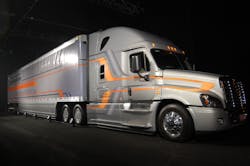National Harbor, MD. At a special press event here in Maryland on Wednesday, Daimler Trucks North America (DTNA) announced that Freightliner Trucks’ new 2014 Cascadia Evolution, powered by the newly designed Detroit DD15 engine paired with enhanced aerodynamic specs, delivered 10.67 miles per gallon (mpg) during recent closed track testing. In a cross-country, on-highway test, the same truck achieved 9.31 mpg.
Hitting the ten mpg mark has been a goal for Class 8 truck makers for some time. “Now the ten-mile-per-gallon truck is within reach,” said Martin Daum, president and CEO of DTNA. “It will not be easy to do, but it is within reach.”
According to Wilfried Achenbach, senior vice president of engineering for DTNA, breaking the ten miles per gallon barrier can extend the value of diesel power well into the future. “Ten miles per gallon is now really a possibility for the future,” he told Fleet Owner in an interview. “Once you hit ten miles per gallon [for a heavy-duty diesel truck,] you just truly can’t compare [any other power source] to it in terms of freight efficiency. Diesel is just amazing.”
The availability of high mpg diesel trucks does not mean that fuel efficiency will cease to be a competitive differentiator for truck fleets, however, Daum noted. There are just too many other variables involved in operating a successful, competitive trucking business, he told Fleet Owner. While things like automatic transmissions and sophisticated, integrated power trains make it easier for more fleets to achieve good efficiency, loads, maintenance cycles, driver behavior, equipment rationalization, trade cycles, access to financing and so on will continue to impact fuel efficiency and competitiveness, he noted.
DTNA has also been very involved in developing natural gas-powered trucks as well as fuel-conserving diesels. The company currently has about 4,000 natural gas vehicles in the field. At this point, it is still harder to predict what the residual value of natural gas-powered chassis will be, Daum said. “If we could predict the cost of diesel in the next five years versus the cost of natural gas, the answer to the residual question for natural gas trucks would be much easier,” he noted.
“When you ask about residuals, you are really asking two questions,” Daum said. “What is the perfect residual? And who takes the risk? The second buyer is much more conservative than the first buyer because he has fewer resources and essentially only his own experience to rely on. That makes him more price-sensitive. We see that with technology now. More basic trucks still deliver the best value in the secondary market.
“We also have no historical price points yet for natural gas vehicles and there are subsidies for the first buyer besides that don’t apply to the secondary market,” he continued. “The ROI for natural gas trucks today is based on the price differential between natural gas and diesel. If I buy a natural gas truck today, I should consider running it long enough to realize my return in the first five to seven years [rather than depending on residual value].”
Daum said that he is not worried about potential shifts in the demand for various types of vehicles when it comes to power sources or to other vehicle specifications, like the current growth in demand for day cabs versus sleepers, for example. “I am not worried because we have a full product line,” he said. “We look at take rate numbers and adjust accordingly, of course, but we really don’t care [which of our products people want.] I am a believer in free markets. A free market is all about delivering value. Business is easy, isn’t it, when you have something of value to offer.”
About the Author
Wendy Leavitt
Wendy Leavitt is a former FleetOwner editor who wrote for the publication from 1998 to 2021.
